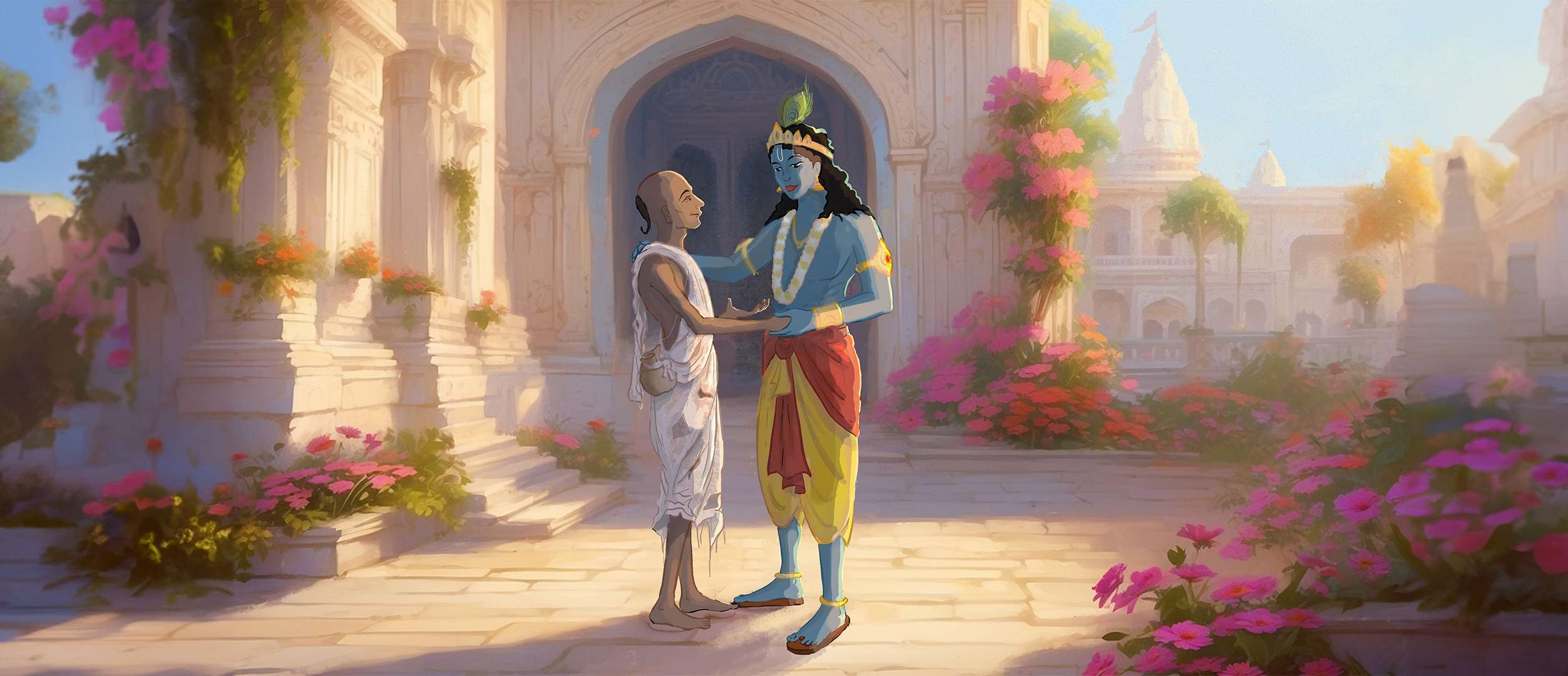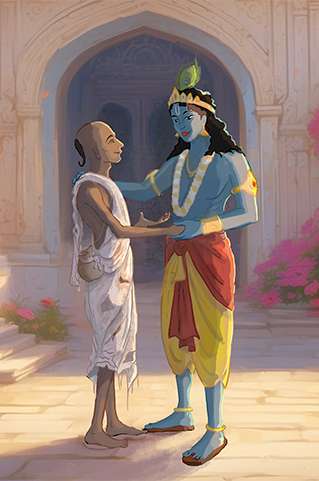



In the rich mosaic of India’s mythological tradition, few beings resonate as profoundly as Krishna, the enigmatic figure whose life was a testament to devotion, love, and dharma. From his tender friendship with the impoverished Sudama to the profound guidance offered to a desolate Arjuna on the battlefield of Kurukshetra, Krishna’s life illuminates timeless insights of true value amidst life's challenges. This exploration delves into the episodes that define Krishna’s unparalleled wisdom and his legacy of leading through love and absolute involvement.
Sadhguru: Krishna enjoyed an enormous amount of love and adulation from those around him, but he also faced extreme moments of danger and disappointment. He navigated through all of these experiences as if they were simple, despite being in situations that would break most human beings. He accepted every form of expression of people’s love, but he never missed an opportunity to make his point.
Krishna always made clear what he valued most. Though he moved among kings and kingdoms were offered to him freely, he never accepted them. Instead, he guided them on how to bring dharma to their realms. What was most dear to Krishna was not what people offered, but how deeply they felt.
There are numerous stories that depict his discernment of what was of utmost value to him. You might have heard of Sudama or Kuchela. When Krishna was studying with Sandipani, there was a boy named Sudama. He was nicknamed Kuchela because he was so thin and poorly clothed, coming from a very poor family. But he was a brilliant boy, and Krishna immediately recognized his quality. A deep rapport developed between them.
Many years passed, but Kuchela’s lot never improved. He remained an extremely poor man. His wife urged him, “Your friend Krishna has become such a great man. Why don’t you go and ask him for help?” Kuchela replied, “My friend is too dear to me. I cannot go and ask him for anything.” But she insisted. Finally, Kuchela thought, “At least let me go and meet Krishna. It’s been so many years.” As a householder, he wanted to take a gift for Krishna. He had nothing but a handful of beaten rice, so he tied it in his cloth and went.
When he came to the palace gates in Dwarka where Krishna lived, the guards, looking at his physical condition and clothes, tried to push him away. But he said, “Please tell Krishna that Sudama has come. If he wants to see me, I will stay; otherwise, I will go.”
The moment the word reached Krishna that Sudama had come, Krishna came running to the gates. He embraced Sudama, took him inside, made him sit on his own seat, and shedding tears, he washed his feet. People could not believe that this beggar-like man from nowhere was being treated by Krishna with such reverence.
Then Krishna asked, “What have you brought for me, Kuchela?” He knew Kuchela would not have come empty-handed. Kuchela was very hesitant and ashamed to present this handful of beaten rice to Krishna, who was living in a palace, but Krishna insisted. Then finally, Kuchela offered this little bit of beaten rice that he had brought. Krishna ate it with great joy and said, “This is the best meal I've ever had in my life!” There are countless incidents like this.
Another such incident occurred on Krishna’s birthday. Extensive preparations had been made for a great celebration with dance, music, and festivities, and a huge number of people had gathered. But Krishna just sat in the house, not willing to participate. Usually, he was game for any kind of celebration, but on that day, he somehow was not.
Rukmini asked him, “What has happened to you, my lord? Why are you not participating in the celebration?” Krishna said, “Oh, I have a headache.” We do not know whether he really had a headache or was just feigning one. Rukmini said, “Let’s call the physician.” The doctor came. They suggested different medicines, but Krishna said, “No, all these things won’t work for me.” By then, a lot of people had gathered, including Satyabama, Narada, and many others.
When they heard that Krishna had a headache, they got worried and asked him, “What should we do?” Krishna said, “Someone who really loves me must take a little dust off their feet and wipe it on my head. Then it’ll become okay.” Satyabama said, “What nonsense! I love you, but there is no way I’m putting dust from my feet on your head.” Rukmini wept, “It’s a sacrilege. We cannot do this.”
Narada declined, saying, “You are the Lord Himself. I don’t know what is involved in this. Is this a trap? If I put the dust off my feet on your head, maybe I’ll burn in hell forever. I don’t want to do such things.” The word spread. Everyone was horrified: “We are not going to do such things. We love him, but we don’t want to go to hell by doing such a thing.”
Everyone was waiting for Krishna to come, but he was sitting there with a headache. When the news went to Vrindavan and the gopis came to know that Krishna had a headache and needed the dust of the feet of someone who loved him to get cured, Radha put the end of her saree on the ground, and all the gopis danced on it wildly. Then they gave the dust-filled cloth to Narada to bring it to Krishna. Krishna tied it around his head and became all right.
Throughout his life, whenever he had the opportunity, Krishna always showed what was most precious to him.
When the Kurukshetra war was imminent and almost everyone in the subcontinent aligned with one of the opposing sides, it was like a fight to finish. Krishna had done everything possible to avoid the war, but when it became inevitable, he was in full flow.
Arjuna, who had been burning with hatred and anger, wanting to avenge all the injustice that had happened to him, lost heart in this situation. He became absolutely desolate looking at the array of people in front of him – his cousins, his uncles, his Guru, his dearest granduncle, the most venerable Bhishma, so many friends, and ordinary men. When he saw them, his heart sank, “How can I kill all these people? What will become of me?”
On the other side, Duryodhana, in spite of having gathered a much larger army than the Pandavas, was also desolate. Knowing that their common Guru Dronacharya and granduncle Bhishma loved the Pandavas very much and that many other people on his side also had deep bonds with them, Duryodhana was deeply worried that these people might forsake him in a crucial moment of battle. So Duryodhana was in one kind of turmoil and desolation; Arjuna was in a different kind of desolation.
The Gita was spoken at this moment of utter desolation and despair on both sides. If you want to know the intricacies of the Gita, it is important to understand this context.